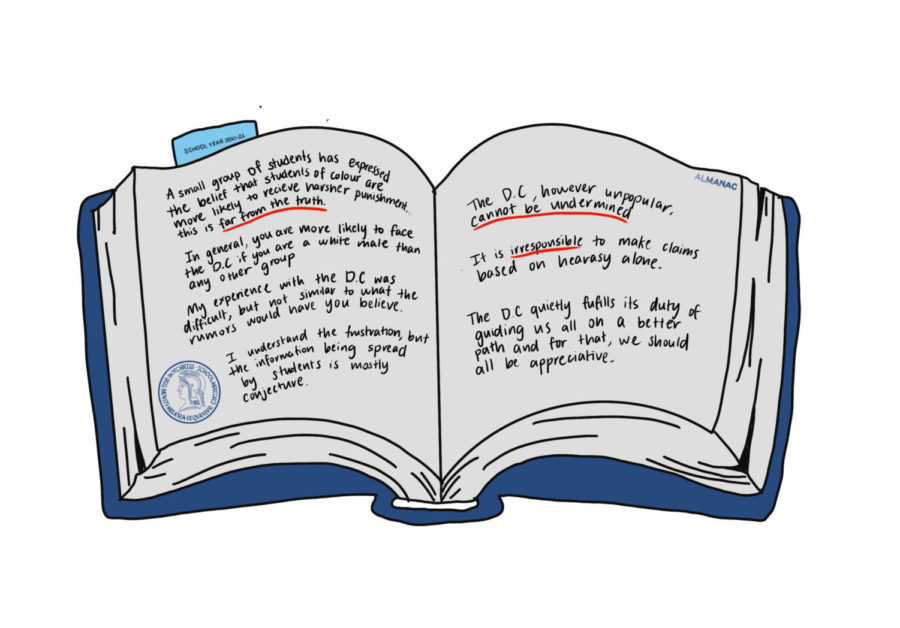In Defense of the Disciplinary Committee
The Record is taking the rare step of publishing an anonymous Opinions essay. We have done so at the request of the author, whose identity is known to us and who could face harmful repercussions by its disclosure. The Record does not grant anonymity to writers merely seeking to avoid accountability.
This spring, many members of our community have criticized the Discipline Committee for handing down punishments they believe are unfair and unjust. This backlash has put the Committee under intense scrutiny, inspiring students to discuss and debate every aspect of its inner workings.
I ask that you separate fact from emotion while reading this article. I know it is frustrating to lose your teammate, proctor, or friend to this process, but we must analyze this topic with logic and reason. After facing the D.C. myself and thoroughly investigating this system, I can only conclude that it represents a just and equitable disciplinary process.
In recent days, regarding an incident involving a student who identified as a minority, the D.C. has been accused of systemic racism. A small group of students has expressed the belief that students of color are more likely to be D.C’ed or are more likely to receive harsher punishment. However, if you look at the statistics sent by Mr. Stephen McKibben, dean of community life, to the student body on March 22, you can see that this is far from the truth. The ratio of white students to minorities appearing in front of the D.C. is more than 2:1 (13 to 6). The ratio of males to females is more than 2:1 as well (13 to 6). Taking into account the school’s demographics (1:1 male to female ratio, and 1:1 white students to minority students ratio), these statistics indicate that, in general, you are just as likely if not more likely to face the D.C. if you are a white male than any other group. Therefore, the myth that students of color are more likely to be D.C.’ed is statistically false.
As for the assertion that students of color are more likely to face harsher punishments, we have no statistics regarding punishments dolled out; we do, however, have statistics regarding students who have chosen to withdraw. While we cannot know the reason for a student withdrawing, it is often to avoid expulsion. Here, the ratio of males to females choosing to withdraw is close to 1:1 (6 to 7) and the ratio of white students to minorities withdrawing is more than 3:1 (10 to 3). These tallies include recent events. Moreover, the D.C. is not given any financial information regarding students’ background; therefore, whether a student’s parents have made a significant donation to the school or whether a student is on financial aid is not taken into consideration.
In an open discussion about the D.C., Mr. McKibben and Mr. Craig Bradley, head of school, explained that the school utilizes an outside consultant to evaluate whether there is any systemic racism in the discipline process and ensure that the process is legal and ethical. All members of the D.C. also undergo mandatory bias training. Members, who are elected by their peers, represent a diverse cross-section of our community and there is no shortage of minority representation.
I myself have faced the Disciplinary Committee. My experience with the D.C. was difficult, but not similar to what some rumors might have you believe. Here is my story.
I knew I had made a mistake. As soon as it happened there was not a doubt in my mind that I would have to face the D.C. I was petrified. The stories of the D.C. are beyond terrifying – hours of deliberations, students not getting into colleges because of something they did their Prep year, and a board filled with people who ask the toughest questions you have ever heard.
Despite these myths, which make the D.C. sound like a punishment in itself, I was surprised to find out how mild the process actually is in comparison to the stories. You write a statement, dress nicely, bring an advisor, and answer questions. The committee does ask tough questions, but their questions are designed to understand your thought process in your moment of weakness. They are designed to help you evaluate what could have been done differently and most importantly how to grow from this experience. One of the questions I received was “What does leadership mean to you?” A difficult question for certain but a far cry from rumors of scolding and shouting. It was clear to me from the moment I entered the room to the moment I left that this process was not biased against me, in fact if anything it was designed to my benefit. It was structured to give me the final word and to allow me to reflect in front of a jury of my peers. They had no intention of causing malice but rather spurring maturity.
After leaving the meeting, the breath of relief I sighed might have been heard across campus. I received an email from Mr. McKibben later that evening with a zoom link. He explained how the committee members reached their decision and offered their recommendations for me. Although it wasn’t necessarily the outcome I wanted, I knew it was fair. This is why it is disappointing to me to see this outrage about the D.C. I understand the frustration, but the information being spread by many students is mostly conjecture. There have only been 19 cases this year (as of March 22), so most people are simply speaking from rumors.
In my research on the D.C., I found that incidents of student outrage and allegations of unfairness towards particularly controversial decisions is not uncommon. Such incidents used to be published in The Record with the details of each case, but changes made over the years such as making the ratio of student to faculty better have addressed these issues.
My defense of the D.C. so far is not to say that I do not think there are areas that could be reformed. I agree with many others that expulsion is too large of a decision to be made by the D.C. I believe that such a decision should be voted on by a slightly larger group of administrators and faculty members. I would add, however, that the D.C. should have the power to recommend cases to be brought before this larger group with a motion to dismiss.
I would recommend that the school address substantial or particularly egregious incidents. In years past Headmasters would send out a letter in The Record or communicate at Stu-Fac. I think we have headed in the right direction in recent days but the lack of communication about particular cases has led to rampant and unnecessary rumors and dissonance between the student body and the administration.
Student frustration at the D.C. is as old as the D.C. itself. Any discipline body will be unpopular with the students they discipline. Yet we must think back to a time when students had no say in their discipline process and their fate was decided by “The Duke” himself. It is a unique thing that students here at Hotchkiss have a jury of their peers to help decide on discipline. In my research, there are very few high schools with a similar process. The D.C, however unpopular, cannot be undermined. Faith in this silent, swift justice guarantees that students feel safe, seen, and supported. We should be extremely hesitant to undermine confidence in this body without any substantial evidence to back it up. Had I heard anything more than rumors, or had I seen any shocking statistics, I would definitely advocate for change; however, it is irresponsible to make claims based on hearsay alone. The facts are there and available if you make time to see them. In student activism, there is a line that must not be crossed and a confidence that must be held above any rumors or whispers. The D.C quietly fulfills its duty of guiding us all on a better path and for that, we should all be appreciative.






